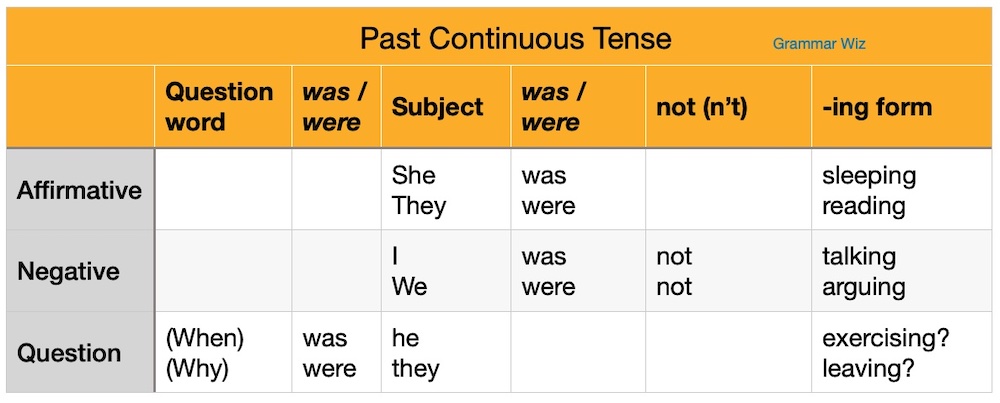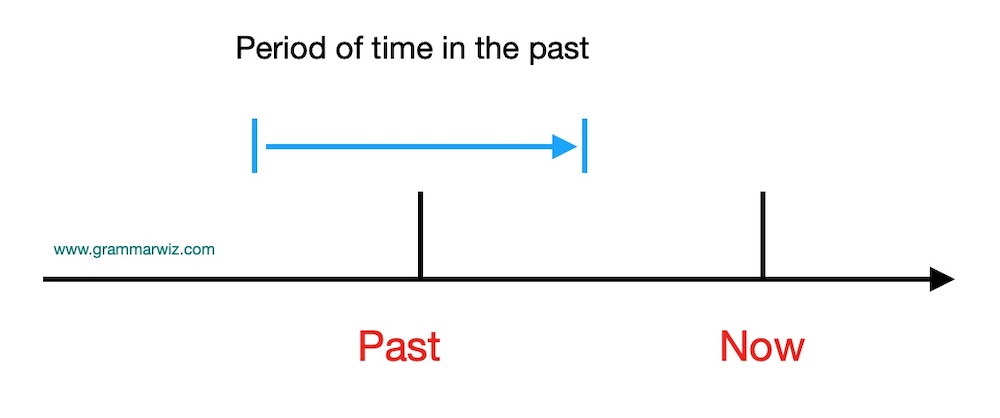Past Continuous Tense with Examples
Here you'll learn about the past continuous tense with examples. This tense is also known as the past progressive.
We'll look at how the tense is formed and when it is used.
Forming the Past Continuous Tense
We form the past continuous tense by using the past tense of 'to be' :
- I was...
- He/She was...
- You were...
- We were...
- They were...
And then adding '-ing' to the verb. For example:
- I was looking for a new coat yesterday afternoon
The different forms are illustrated in the table below. For the question form, 'to be' is placed at the beginning or after the question word (e.g. where, when etc) if one is being used.
Though there are exceptions to the rule, we generally don't use the past continuous tense (or other continuous tenses) with state verbs, which are verbs that describe states or conditions e.g. know, believe, understand etc.
When do we use the Past Continuous Tense?
The past continuous tense is broadly used to discuss periods of time in the past. So events that started at a particular time in the past, continued for a time, then finished.
It is illustrated in this timeline:
These are the main uses.
Completed Past Events
This should not be confused with the past simple, which we often tell learners is used to describe completed events/actions in the past.
With the past continuous, these are completed actions. However, by using the past continuous we are stressing that the action was over a fixed period of time. 'Completed' means the action being referred to was started and finished.
These are commonly used with phrases/words such as all day/morning etc, the whole time, every minute, and so on.
Examples of completed past events:
- She was swimming yesterday morning
- I was working hard all day yesterday
- Why were you crying in the meeting this morning?
- They weren't planning anything bad
We could use the past simple for these. For instance:
- Why did you cry in the meeting yesterday
- She swam yesterday morning
But by using the past continuous rather than the past simple, the emphasis is placed on the activity and the fact that it lasted a while before it finished.
Repeated Events or Habits
It's not always just that the event lasted a while, or a period of time, but the fact that it was happening again and again or is a habit.
The present continuous is also used for repeated events or habits, but in this case the event or habit started and finished in the past.
Examples of words commonly used with this use of the past continuous tense are:
- always
- constantly
- every day
- most days
- often
- forever
Examples of repeated past events:
- They were always arguing when they were married
- She was constantly cleaning her house when she first moved in
- He was forever forgetting where he put his keys
Interrupted & Unfinished Past Events
The past continuous tense is also used to describe events that were not completed, or in other words unfinished, because there was an interruption.
This is sometimes called the 'interrupted past continuous'. In this use, the event or action was stopped at a key point in the past.
Note that if the interrupting event has a verb, the past or present tenses could be used, depending on when the sentence is being said.
Examples of interrupted past events:
- John was downloading some files when the Internet cut out (so the downloading was not finished)
- I was having an amazing dream but then I woke up (so the waking up interrupted and stopped the dream)
Using the past continuous for a change of mind is sometimes referred to as a separate use. Really though this is still an interrupted event. The plan was ongoing but it was then interrupted or stopped by the change of mind.
Examples of a change of mind:
- John was planning to get his hair cut but decided he didn't need it yet
- I was going to spend the day in town but it has started raining so I'll stay in
In the second example you can see how a present tense can also be used (in this case the present perfect). In this case the speaker is saying the sentence at the present time - it has just started raining so he's decided not to go.
Intervening Past Events
This refers to a situation where something is happening over time, but there is an intervening event.
Unlike the unfinished events above which stop, in this case the event over a period continues despite the interruption.
Note that if the intervening event has a verb, it is in the past simple. The present tense can't be used as in the previous cases. This is because the intervening event is happening during the past time frame so it's impossible that it could occur in the present.
So we are using the past continuous to express a long action and the past simple to express a short action that happens in the middle of the long action. It is common to join the two ideas with when.
Examples of intervening past events:
- I was walking to work when I met Ruth (I likely continued walking to work afterwards)
- They were still working at 6pm (and they continued working after 6pm)
- My husband was making the dinner when I got home (this didn't stop when she got home)
It's worth noting here that you would use the past continuous tense instead of the past simple if the other action was also a long action and not really intervening. In other words, they could have been going on for similar or the same amounts of time.
In this case it's common to use while. For example:
- My wife was making the dinner while I was fixing the car.
Background to a Story
We often use the past continuous to describe the background to a story written in the past tense, so you'll commonly see it in books.
In reality this is the same as the Interrupted Past Events use of the past continuous because we are explaining what was happening in the background (past continuous) when the specific event/action in the story took place (past simple).
Example of a background story:
The rain was beating down hard and the wind blowing* violently as John walked slowly along the beach. The waves were crashing loudly onto the sand as he turned to the sea and stared out to the horizon.
*we don't need to repeat 'was' as it was used before 'beating'
Past Continuous Tense Quizzes >>
New! Comments
Any questions or comments about the grammar discussed on this page?
Post your comment here.














